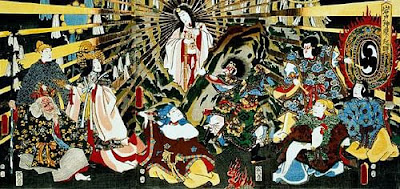Disappointed in
love, weary of war, Goran von Hagen retreats to his idyllic alpine estate. He
does not know the dark and ancient secret of the looming mountain--or that it
will change his life forever.

She/He is 241 Feet long, 20 feet wide and 66 feet high and carved out of bedrock on the Giza plateau. Some years ago, an excavation beneath her paws discovered several rectangular chambers buried there. This, of course, set off a flurry of speculation, for the seer Edgar Cayce years ago prophesied that an ancient "hall of records" was buried beneath the Sphinx, and that here we would finally discover all the lost knowledge of ancient, vanished antediluvian civilizations. Sadly, no such luck. The original monster is perhaps an image of the one of Khufu's sons, either Khafre or Djeddefre. He does resemble the surviving bust of Khafre, that we know.
I became involved with this creature later, in her Greek guise, when I purchased a set of Susan Eleanor Boulet's Goddesses Knowledge cards umpteen years ago. Recently, I have been pulling a card a day, and, after reading the description, I go searching in various books I have on mythology and sacred symbols to refresh my memory. (This is better for my mental health than watching the news.)
The Oedipus myth comes from the Greeks. To the Egyptians, the being was similar, but not identical; the Great Sphinx doesn't have wings and is masculine. I have a feeling that this goddess was downgraded by the patriarchy in Greece, because an Eternal is not the kind of lesser being who would become so despondent after hearing the correct answer to her famous riddle that she would hurl herself off the walls of Thebes and kill(!?) herself. Maybe she just left town, which is another, and IMO, better, version of the Oedipus story. Besides, this sort of entity always wins the game one way or another. The Sphinx certainly had the last laugh with Oedipus, who survives her riddle game only to kill his father, marry his mother and then blind himself in horror after he makes his belated discovery. The Sphinx is an emanation of Nature, and Nature, (as we are all soon to learn,) "bats last."
"Part animal, part human" the card says, but, of course, those designations are essentially meaningless, a false separation. Perhaps, the Sphinx is a being who represents both the rational and the instinctive natures of conscious beings, as her image--woman, lion, eagle--appears to represent. Sphinx in Greece were often found as mortuary decorations, a fierce guardian of a last resting place. "Sphinx" is from the Greek, and it means "strangler," because that is how lions kill their prey. Lions and eagles are typically royal, solar deities, and Michael Babcock, who wrote the text on the Boulet cards, believes that she is also an oracular being, "keeper of the great mystery."
In Barbara Walker's "Woman's Encyclopedia of Myths and Secrets" she describes the Sphinx as a "two-faced Goddess of Birth and Death," because in many glyphs she looks in two directions, with two heads and two foreparts, xerefu and akeru, which translates to the "Lions of Yesterday and Today." You can see xerefu and akeru rendered, one in black, and the other in white, in many Tarot decks on the VII card of the Major Arcana, called The Chariot. The material triumph of the conquering Charioteer may be completely overturned by neighboring cards, or, if it presents in reverse.
~~Juliet Waldron


.jpg)







.jpg)





















